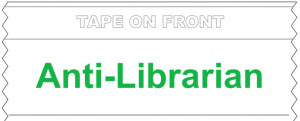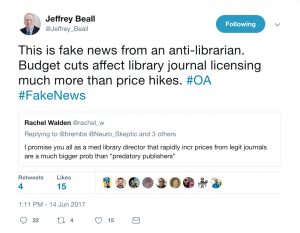As I suspect is the case with many members, my relationship with the American Library Association runs hot and cold. On the one hand, like Soylent Green, ALA is people: I have been privileged to meet and work with many excellent folk through ALA, LITA, and ALCTS (though to complete the metaphor, sometimes I’ve seen ALA chew on people until they felt they had nothing left to give). There are folks among ALA members and staff whose example I hope to better emulate, including Andromeda Yelton, Deborah Caldwell-Stone, Keri Cascio, and Jenny Levine. I also wish that Courtney Young were ALA president now.
And yet.
For what follows, unfortunately I feel compelled to state my bona fides: yes, I have been and am active in ALA. I sign petitions; I grit my teeth each year and make my way through ballots that are ridiculously long; I have chaired interest groups — and started one; I’ve served on an ALA-level subcommittee; I helped organize a revenue-producing pre-conference. Of course, many people have rather more substantial records of service with ALA than I do, but I’ve paid my dues with more than just my annual membership check.
To put it another way, the spitballs I’m about to throw are coming from a decent seat in orchestra left, not the peanut gallery.
So, let’s consider the press releases.
This one from 15 November, ALA offers expertise, resources to incoming administration and Congress:
“The American Library Association is dedicated to helping all our nation’s elected leaders identify solutions to the challenges our country faces,” ALA President Julie Todaro said. “We are ready to work with President-elect Trump, his transition team, incoming administration and members of Congress to bring more economic opportunity to all Americans and advance other goals we have in common.”
Or this one from 17 November, Libraries bolster opportunity — new briefs show how libraries support policy priorities of new administration:
The American Library Association (ALA) released three briefs highlighting how libraries can advance specific policy priorities of the incoming Trump Administration in the areas of entrepreneurship, services to veterans and broadband adoption and use.
In other words, the premier professional organization for U.S. librarians is suggesting that not only must we work with an incoming administration that is blatantly racist, fascist, and no friend of knowledge, we support his priorities?
Hell no.
Let’s pause to imagine the sounds of a record scratch followed by quick backpedaling.
Although it appears that a website redesign has muddied the online archives, I note that ALA does not appear to have issued a press release expressing its willingness to work with Obama’s administration back in 2008. In fact, an opinion piece around that time (appropriately) expressed ALA’s expectations of the incoming Obama administration:
During this time of transition in our nation’s leadership, the greatest challenge we face is getting our economy back on its feet. As our country faces the challenges and uncertainty of this time, the public library is one constant that all Americans, regardless of age or economic status, can count on, and it is incumbent on our leaders make it a priority to ensure America’s libraries remain open and ready to serve the needs of students, job seekers, investors, business people and others in the community who want information and need a place to get it.
Note the politely-phrased implicit demand here: “Mr. President-Elect: we have shown our value; you must now work to bolster us.”
This is how we should act with our political leaders: with the courage of our convictions.
Of course, it was easy to do that with a president who was obviously not about to start tearing down public libraries.
Consider this from Julie Todaro’s Q&A about the whole mess (emphasis mine):
Why did we write the press releases in the first place?
ALA often reaches out to constituents, advocates, and decision-makers – both proactively and reactively – to request actions, express our support for actions taken, request a decision-maker consider libraries in general, and request that libraries be considered for specific activities or purposes. My presidential initiative focuses on library professionals and library supporters as experts and on their expertise, and on the importance of various library initiatives in communities and institutions of all types and sizes – and on the importance of communicating this value to decision-makers. In making a strong case for the value of libraries – in any political environment – it is important to state that case from the perspective of the decision-maker. So, if a legislator or administrator is focused on the importance of small businesses and their effect on the community, for example, the strategy is to prepare a statement illustrating how libraries support small businesses within their community – and how they could be even more effective with supportive legislation, funding or other appropriate action. Our stories – combined with data –can be framed to align our vision with other visions – always within the framework of our values.
Really? What on earth was that decision-maker’s perspective imagined to be?
That of a normal business man, fond of his tax cuts but not wholly bereft of a sense that some leavings from his financial empire ought to be sprinkled around for the public good, or at least the assuagement of a guilty conscience?
That of a conservative, Republican, library board member, who might never vote to eliminate overdue fines but at least recognizes that a town is not complete without its library?
That of a entrepreneur overfond of his technological toys, who at least might be shown that there are some things Google neither finds nor indexes?
Such people might be reachable.
A conman is not.
A conman who explicitly denies the value of acquiring information. A conman who unapologetically names a white nationalist as his chief counselor. A conman whose Cabinet picks are nearly uniformly those who would pillage the departments they would lead. A conman who, unlike George W. Bush, has no known personal connection to libraries.
A conman who cannot be bought off, even if ALA were to liquidate itself.
Cowering before Trump will not save us; will not save libraries. I do not suggest that ALA should have pulled the tiger’s tail; in the face of fascism, such moral authority as we possess only works quietly. We are in for the long haul; consequently, it would have been appropriate, if not necessarily courageous, for ALA to have said nothing to the incoming administration.
One of the things that appalls me about the press releases is the lack of foresight. There was no reason to expect that Trump would respect craven offerings, and it was entirely predictable that a significant portion of the membership would object to the attempt.
Contrary to Naomi Schaefer Riley’s piece in the New York Post, libraries are not suddenly political. However, in its recent actions, ALA deserves the contempt she expresses: an organization that yanks two press releases is, at least, inept — inept beyond the normal slow pace of library decision-making.
ALA desperately need to do better. The political climate is unfriendly enough even before we consider creeping fascism: we should not plan on the survival of IMLS and LSTA nor on the Copyright Office remaining under the oversight of the Librarian of Congress. An administration that is hinting at a purge of EPA scientists who investigate climate change will not hesitate to suppress their writings. An administration that seeks to expand a registry of Muslims may not stoop at demanding lists of library patrons who have checked out books in Dewey 297.
And frankly, I expect libraries to lose a lot of battles on Capitol Hill, although I do think there is at least some hope that smart action in Washington, but particularly at the state level, might ameliorate some of the losses.
But only if we recognize the situation for what it is. We face both the apotheosis of GOP efforts to diminish, dismantle, and privatize government services and a resurgence of unrestrained racism and white nationalism.
I just hope that ALA will remain with me in resisting.


